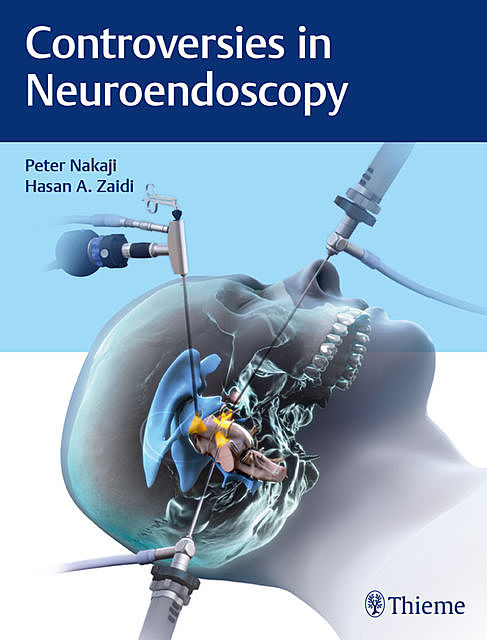We use cookies to improve the Bookmate website experience and our recommendations.
To learn more, please read our Cookie Policy.
To learn more, please read our Cookie Policy.
Accept All Cookies
Cookie Settings

Read in our apps:
iOS
·Android
Peter Nakaji,Hasan A. Zaidi
Controversies in Neuroendoscopy
Notify me when the book’s added
Impression
Add to shelf
Already read
Report an error in the book
Share
Facebook
Twitter
Copy link
To read this book, upload an EPUB or FB2 file to Bookmate. How do I upload a book?
A unique perspective on neuroendoscopic versus microsurgical techniques from world-renowned neurosurgeons
In the last two decades, neuroendoscopy has evolved from a fringe neurosurgical tool to an established subspecialty focusing on the treatment of diverse cranial and spinal diseases. Today, neuroendoscopic technology is widely used to treat supratentorial diseases, skull base pathologies, craniocervical diseases, and spinal pathologies. Despite the expanded use of neuroendoscopy across several subspecialties, its benefits and disadvantages versus those of traditional microsurgical methods remain highly controversial. Contradictory evidence in the neurosurgical literature adds to the surgical decision-making challenges for veteran and novice practitioners alike.
Controversies in Neuroendoscopy by Peter Nakaji and Hasan Zaidi fills an unmet need for a book encompassing best practices, patient selection, and limitations and advantages of neuroendoscopic surgical approaches. Each case presents firsthand knowledge of internationally esteemed neurosurgeons, with a moderator, an endoscopic expert, and an expert in traditional microsurgical approaches. The unique discussion of neuroendoscopy versus microsurgery enables readers to compare the benefits and pitfalls of endoscopic and open microsurgical procedures for a wide range of conditions.
In-depth comparative guidance on applications of the flexible endoscope, rigid endoscope, 3D endoscope, and high-definition 2D endoscope versus the microscopeA full spectrum of neurological conditions across the age continuum with comparative approaches for skull base surgery, pituitary surgery, hydrocephalus, spinal surgery, peripheral nerve surgery, and arachnoid cyst fenestrationRadiological imaging and intraoperative photographs enhance cases and provide precise, insightful technical guidanceHigh-quality color illustrations from the skilled medical illustrators at Barrow Neurological Institute reinforce key points and surgical techniquesNeurosurgery residents, neurosurgeons, and spine surgeons will all benefit from reading this remarkable book cover to cover, and they will no doubt use it as a go-to resource for specific cases.
This book includes complimentary access to a digital copy on https://medone.thieme.com.
In the last two decades, neuroendoscopy has evolved from a fringe neurosurgical tool to an established subspecialty focusing on the treatment of diverse cranial and spinal diseases. Today, neuroendoscopic technology is widely used to treat supratentorial diseases, skull base pathologies, craniocervical diseases, and spinal pathologies. Despite the expanded use of neuroendoscopy across several subspecialties, its benefits and disadvantages versus those of traditional microsurgical methods remain highly controversial. Contradictory evidence in the neurosurgical literature adds to the surgical decision-making challenges for veteran and novice practitioners alike.
Controversies in Neuroendoscopy by Peter Nakaji and Hasan Zaidi fills an unmet need for a book encompassing best practices, patient selection, and limitations and advantages of neuroendoscopic surgical approaches. Each case presents firsthand knowledge of internationally esteemed neurosurgeons, with a moderator, an endoscopic expert, and an expert in traditional microsurgical approaches. The unique discussion of neuroendoscopy versus microsurgery enables readers to compare the benefits and pitfalls of endoscopic and open microsurgical procedures for a wide range of conditions.
In-depth comparative guidance on applications of the flexible endoscope, rigid endoscope, 3D endoscope, and high-definition 2D endoscope versus the microscopeA full spectrum of neurological conditions across the age continuum with comparative approaches for skull base surgery, pituitary surgery, hydrocephalus, spinal surgery, peripheral nerve surgery, and arachnoid cyst fenestrationRadiological imaging and intraoperative photographs enhance cases and provide precise, insightful technical guidanceHigh-quality color illustrations from the skilled medical illustrators at Barrow Neurological Institute reinforce key points and surgical techniquesNeurosurgery residents, neurosurgeons, and spine surgeons will all benefit from reading this remarkable book cover to cover, and they will no doubt use it as a go-to resource for specific cases.
This book includes complimentary access to a digital copy on https://medone.thieme.com.
more
This book is currently unavailable
1,037 printed pages
Have you already read it? How did you like it?
👍👎
fb2epub
Drag & drop your files
(not more than 5 at once)

